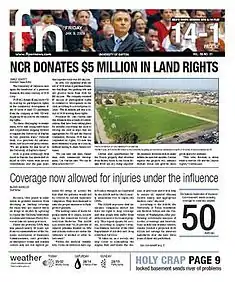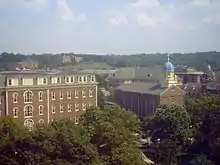Flyer News
Flyer News, also known as "fn", is the independent student newspaper of the University of Dayton in Dayton, Ohio. It was first published October 21, 1959 and is now published once weekly while classes are in session, for a total of 20 issues per academic year. Currently, 4,000 copies of each issue are distributed throughout campus. Each issue is typically 16 pages long and includes four sections: news, arts and entertainment, opinions and sports.
 The January 9, 2009 front page of Flyer News | |
| Type | Bi-Weekly newspaper |
|---|---|
| Format | Tabloid |
| Owner(s) | University of Dayton student newspaper |
| Founded | 1959 |
| Headquarters | Kennedy Union Suite 232 Dayton, OH 45469-0626 |
| Circulation | 4,000 Tuesday |
| Website | www.flyernews.com |
History
The history of the student press at the University of Dayton starts with The Exponent, which began publication in 1902. The Exponent was more literary magazine than newspaper. It was published annually at first, then monthly. Over time, The Exponent expanded its mission to include news, particularly during World War I, but it reverted to a literary magazine with the introduction of The University of Dayton News in 1933. This paper was published every two weeks. The Exponent lasted into the early 1960s as a literary magazine.
The University of Dayton News newspaper became a four-page broadsheet in 1935. It was discontinued in 1944, partly to save paper during World War II, and was restored in 1946, still a broadsheet published once every two weeks. The paper continued on that basis until February 1955. At that time, the newspaper changed printers to a non-union shop to allow students to help with production and to save money. The new printer could not handle broadsheet pages, and The University of Dayton News would not fit across the top of a tabloid page, so the name of the paper was changed to the Dayton Flyer. For the October 21, 1959 issue, the name was changed to Flyer News. The page count and publication schedule were occasionally irregular. By the end of the decade, however, advertising had stabilized and Flyer News began publishing twice a week, a schedule that continued until 2013. At the start of the 2013-2014 academic year, the paper became weekly and expanded to 16 pages per issue. Although the paper is only published once a week, the website is consistently updated with relevant breaking news stories.[1]
Though the newspaper was not called Flyer News until 1959, it generally includes the Dayton Flyer as part of its lineage, as it too was a student-produced tabloid at the University of Dayton. This places the first year of the newspaper in 1955. In addition, both volume 31 and volume 32 were produced during the 1984-1985 academic year; it is unknown why this was done.
Structure
Because the University of Dayton is a private university, it is theoretically in control of all content produced on university property. However, due to a long-standing agreement with the university, Flyer News has remained independent. The current advisor for the paper, Professor J. Frazier Smith, has been in his position since 2012. Unlike many other private college newspapers, the advisor exists only to provide feedback and advice to the current staff. The holder of the post does not act to censor, edit or otherwise control the content of the newspaper.
The newspaper employs numerous students who fill positions in the news, arts and entertainment, opinions, sports, design, advertising, business, copy editing, photography, web and editorial departments of the newspaper. At the end of each academic year, a panel of senior staff members selects an Editor-in-Chief for the following year. This Editor-in-Chief then selects his or her own staff for the following year.
Unlike many student publications, employees are not paid through an hourly wage or a salary but rather through a scholarship. The amount of the scholarship is based on the position held. The cost of these scholarships, along with all other expenses, are paid by Flyer News through the advertising that is included in the newspaper.
Honors
In 1989, Flyer News received its first All-American award from the Associated Collegiate Press. The award is based on above average performance in four of five categories, which are coverage and content, writing and editing, layout and design, leadership, and photography, art and graphics. The newspaper continued to receive this award each year for the following nine years until it was inducted into the ACP Hall of Fame in 2000. Flyer News was the 34th newspaper to be named to this group. There are currently 57 members of the ACP Hall of Fame.[2]
The publication has also received a number of other awards. It received the Top Organization Award from the University of Dayton in both the 1996-1997 and 2000-2001 academic years. It also received a Certificate of Appreciation from the University of Dayton Department of Military Science Army ROTC in 2001 an Award of Merit from the Ohio College Newspaper Association.
Archives
The newspaper has a near complete archive of its publications. Archives begin with volume 3 (1956–1957). Partially complete archives exist through volume 21 (1974–1975), with many, but not all, issues of the paper existing in the form of bound volumes. Starting with volume 22 (1975–1976), there is a complete physical archive of all issues of the newspaper.
In addition to this paper archive, construction has begun of a digital archive of all issues produced dating back to 1956. Complete soft copy records have been compiled for all issues produced after September 1, 1998, with the notable exception of issues appearing between January 13, 2004, and April 20, 2004, due to the loss of an archival disc. Digital scans of the print archives can be found at the following location: https://flyernews.com/print-archives/
See also
References
- Wert, Kay. University of Dayton research paper, as provided by Dr. Larry Lain. 1982.
- "ACP - Contest Winners." Associated Collegiate Press. ACP Hall of Fame. "Archived copy". Archived from the original on 1999-02-20. Retrieved 2010-02-07.CS1 maint: archived copy as title (link).
